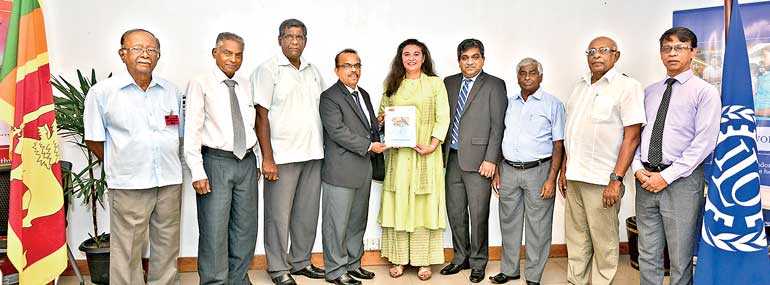Saturday Feb 14, 2026
Saturday Feb 14, 2026
Thursday, 17 May 2018 00:00 - - {{hitsCtrl.values.hits}}
 From left: Ceylon Federation of Trade Unions General Secretary D.W. Subasinghe, Ceylon Workers Congress Vice President K. Marimuttu, National Trade Union Federation General Secretary P. Ranawakarchchi, Labour and Trade Union Relations Ministry Secretary S.A.N. Saranatissa, ILO Country Director Simrin Singh, EFC Director General Kanishka Weerasinghe, Free Trade Zones and General Services Employees Union Joint Secretary Anton Marcus, Nidhahas Sevaka Sangamaya General Secretary Leslie Devendra and Labour Department Commissioner A. Wimalaweera – Pic by Daminda Harsha Perera
From left: Ceylon Federation of Trade Unions General Secretary D.W. Subasinghe, Ceylon Workers Congress Vice President K. Marimuttu, National Trade Union Federation General Secretary P. Ranawakarchchi, Labour and Trade Union Relations Ministry Secretary S.A.N. Saranatissa, ILO Country Director Simrin Singh, EFC Director General Kanishka Weerasinghe, Free Trade Zones and General Services Employees Union Joint Secretary Anton Marcus, Nidhahas Sevaka Sangamaya General Secretary Leslie Devendra and Labour Department Commissioner A. Wimalaweera – Pic by Daminda Harsha Perera
By Charumini de Silva
The fourth edition of ‘Decent Work Country Program’ (DWCP) 2018-2022 was launched yesterday with the aim to deliver dignity, equality, protection and prosperity in the world of work for Sri Lanka’s workforce now and in the future.
The official Memorandum of Understanding (MoU) was signed between the International Labour Organisation (ILO) Country Director Simrin Singh, Labour and Trade Union Relations Ministry Secretary S.A.N. Saranatissa, Employers’ Federation of Ceylon (EFC) Director General Kanishka Weerasinghe, Sri Lanka Nidahas Sevaka Sangamaya General Secretary Leslie Devendra, National Trade Union Federation Secretary General P. Ranawakaarachchi, Ceylon Workers Congress Vice President K. Marimuttu, Ceylon Federation of Trade Unions General Secretary D.W. Subasinghe and Free Trade Zone and General Services Employees’ Union Joint Secretary Anton Marcus at the United Nations (UN) Compound in Colombo.
A DWCP is the primary program framework for the work of the ILO in a country. The Sri Lanka DWCP 2018-2022 was developed after a robust and inclusive consultative process from July 2017 till April this year with the ILO’s tripartite constituents (State, employers’ and workers’ organisations), relevant ministries, district government officials, women, men and youth members of the cooperatives, UN agencies and development partners.
The DWCP sets out how the Government, employers’ organisations and workers’ organisations together with other vital grassroots, national and international stakeholders will work strategically to achieve tangible results in a number of decent work areas over the next five years.
The DWCP 2018-2022 process began at the conclusion of a review of the previous DWCP 2013-2017, which provided important insight to help inform thinking around the next DWCP.
According to the program the core country priorities include; the creation of sustainable, inclusive and decent employment, better governance of the labour market, ensuring rights at work for all and greater data and knowledge generation. The four outcome areas are closely aligned with national policy frameworks and constituent priorities.
Labour and Trade Union Relations Ministry Secretary S.A.N. Saranatissa extended full support to implement the DWCP 2018-2022 successfully and believes they will be able to achieve maximum outcome from this project.
Inclusion of persons with disabilities and enhanced pursuit of gender equality and equity in the world of work, while building climate resilience for secure and thriving livelihoods as well as economic growth are prominently featured in the fourth edition of the Sri Lanka DWCP 2018-2022.
ILO Country Director Simrin Singh commended all the counterparts for their wisdom and full on commitment to develop the five-year DWCP for Sri Lanka.
ILO is the UN’s specialised agency that promotes a job-centred and rights-based approach to development through social justice and the Decent Work Agenda. It provides technical assistance to its member states through a DWCP, which details the policies, strategies and results required to realize progress in each country, towards the goal of decent work for all.
She believes the fourth edition of DWCP 2018-2022 will be implemented effectively in the world of work for Sri Lanka’s workforce now and in the future.
EFC Director General Kanishka Weerasinghe said the institute had successfully met all its goals in previous editions and was confident that they would be able to achieve this year’s objectives and even go beyond.
The DWCP anticipates the implications of the ‘Future Work’ as a key factor in attaining the Sustainable Development Goals (SDGs) by 2030, particular goal 8 on Decent Work and Economic Growth.